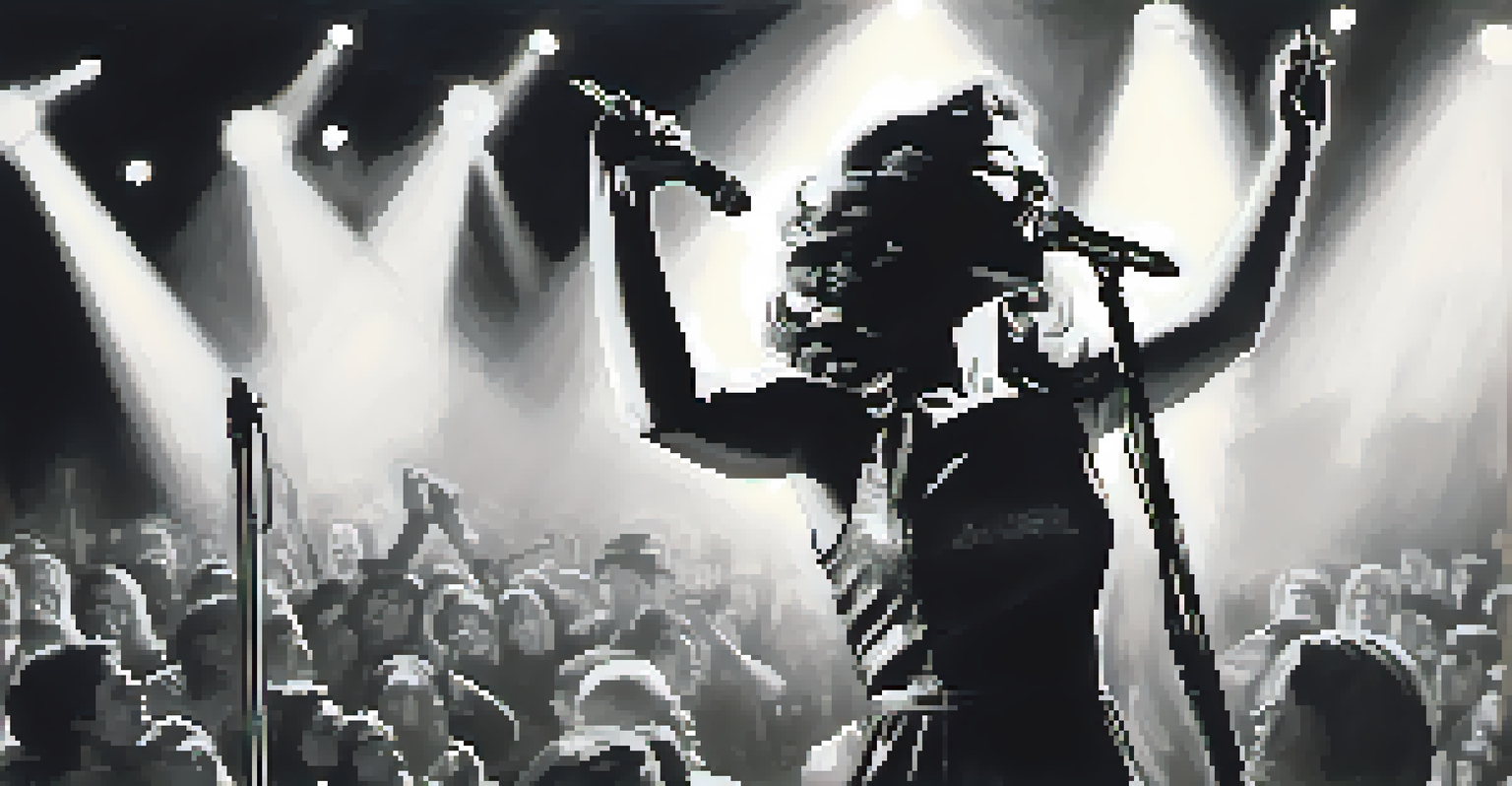Rock 'n' Roll: A Catalyst for Political Change in the 1960s

The Birth of Rock 'n' Roll and Its Cultural Impact
Rock 'n' roll emerged in the early 1950s, blending rhythm and blues with country music. This new sound resonated with the youth, creating a cultural shift that encouraged rebellion and self-expression. Artists like Chuck Berry and Elvis Presley became icons, not just for their music, but for their ability to challenge societal norms.
Rock music has always been a force for social change, bringing voices together to fight for what is right.
As the genre gained popularity, it became intertwined with the social movements of the 1960s. Young people, inspired by the music, began to question authority and the status quo. The infectious beats and catchy lyrics served as a soundtrack for a generation eager for change.
The cultural impact was profound, as rock 'n' roll provided a voice for those feeling marginalized. It set the stage for a vibrant youth culture that was ready to take a stand on critical issues like civil rights and anti-war protests.
Rock 'n' Roll and the Civil Rights Movement
The civil rights movement of the 1960s sought to end racial segregation and discrimination against African Americans. Rock 'n' roll played a crucial role in this movement by promoting unity and breaking down racial barriers. Songs by artists like Sam Cooke and James Brown became anthems that inspired hope and resilience.

Concerts and festivals often served as platforms for civil rights activism, bringing diverse audiences together. Music events like the 1963 March on Washington featured performances that highlighted the struggles for equality. This merging of music and activism galvanized the youth, encouraging them to participate in the fight for civil rights.
Rock 'n' Roll as Cultural Catalyst
Rock 'n' roll emerged as a powerful force in the 1950s, inspiring youth to challenge societal norms and embrace self-expression.
Rock 'n' roll helped to humanize the struggles faced by African Americans, making the movement relatable to a broader audience. By fostering empathy and understanding, the music contributed to a national dialogue about race and justice.
Anti-War Sentiment: Rock Music as Protest
The Vietnam War sparked widespread protest in the United States, and rock music became a powerful medium for expressing anti-war sentiments. Artists like Bob Dylan and Creedence Clearwater Revival used their platforms to voice dissent, creating songs that captured the frustration and anger of a generation. Tracks like 'Blowin' in the Wind' questioned the morality of war and called for peace.
The power of music can never be underestimated; it has the ability to inspire and unite us in the fight for justice.
Music festivals like Woodstock in 1969 became symbols of the counterculture movement, showcasing artists who stood against the war. These gatherings not only celebrated music but also fostered a sense of community among those opposed to the conflict. The festival's message of peace and love resonated deeply with attendees.
As rock 'n' roll became synonymous with the anti-war movement, it encouraged young people to take action and protest. The genre's ability to articulate the feelings of disillusionment and resistance became a rallying cry for many seeking to bring about change.
The Role of Women in Rock 'n' Roll and Activism
Women played a vital role in the rock 'n' roll scene of the 1960s, both as artists and activists. Icons like Janis Joplin and Joan Baez not only broke musical barriers but also used their voices to advocate for social change. Their music often addressed themes of empowerment and equality, inspiring women to challenge gender norms.
The feminist movement was gaining momentum during this time, and rock music became a means for women to express their frustrations and aspirations. Songs that highlighted women's rights and liberation resonated with audiences, further amplifying the message of equality. Artists like Aretha Franklin became symbols of strength and resilience.
Music's Role in Civil Rights
The genre played a crucial role in the civil rights movement, using its platform to promote unity and break down racial barriers.
The intersection of rock 'n' roll and feminism created a space for dialogue about women's rights. As women stepped into the spotlight, they helped to reshape the narrative around gender roles, influencing both music and society.
Iconic Festivals: Gathering Grounds for Change
Major music festivals in the 1960s, such as Woodstock and the Monterey Pop Festival, became more than just concerts—they were gatherings for social change. These events attracted thousands, creating a vibrant atmosphere filled with ideals of peace, love, and activism. Artists performed not just for entertainment, but to inspire collective action and solidarity.
At these festivals, audiences were exposed to a wide range of political messages, fostering a sense of community among like-minded individuals. The blending of music and activism showcased the power of art to ignite passion and motivate change. Concertgoers left with a sense of purpose and empowerment.
The legacy of these iconic festivals continues to influence social movements today. By uniting people through music, they demonstrated that rock 'n' roll could be a catalyst for political engagement and a force for good.
The Legacy of 1960s Rock 'n' Roll on Modern Activism
The influence of 1960s rock 'n' roll on modern activism is undeniable. Today's artists continue to use their music to address social issues, echoing the spirit of their predecessors. From hip-hop to pop, musicians leverage their platforms to raise awareness about everything from climate change to racial injustice.
Social media has changed the landscape of activism, allowing artists to connect with fans and mobilize movements in real-time. Just as rock 'n' roll once brought people together, contemporary music fosters a sense of community and shared purpose. Campaigns like 'Black Lives Matter' have found strong support within the music industry.
Legacy of Activism in Modern Music
The influence of 1960s rock 'n' roll continues today, with contemporary artists leveraging their platforms to address social issues and inspire change.
The legacy of the 1960s is a reminder that music can unite people across divides and inspire action. As artists today continue to engage in activism, they honor the tradition of using rock 'n' roll as a powerful tool for change.
Conclusion: Rock 'n' Roll's Enduring Impact on Society
Rock 'n' roll was more than a musical revolution; it was a social movement that challenged norms and inspired change. Throughout the 1960s, the genre became a catalyst for political activism, giving voice to the frustrations and hopes of a generation. The music played an integral role in significant movements, including civil rights and anti-war protests.
The artists of this era not only created unforgettable songs but also fostered a culture of activism that continues to resonate today. Their influence can be seen in contemporary music, where artists still harness the power of their platforms to advocate for social justice. This enduring impact underscores the interconnectedness of art and activism.

As we reflect on the legacy of rock 'n' roll, it is clear that music has the power to inspire change. The genre's ability to unite people and ignite passion serves as a reminder that art can indeed be a force for good in the world.